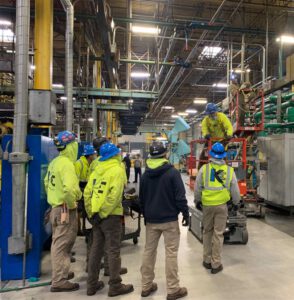Having an emergency electrician at hand when a problem arises is important for the safety of your home. Even a simple electrical repair can be dangerous when handled incorrectly. This is why it’s vital to know what signs you should look out for that indicate an electrical emergency and call an emergency electrician immediately.
 Having a professional electrician available 24 hours a day means that you can always get your electrical issue fixed no matter the time. That can save you a lot of hassle when an electrical problem arises at the worst possible times.
Having a professional electrician available 24 hours a day means that you can always get your electrical issue fixed no matter the time. That can save you a lot of hassle when an electrical problem arises at the worst possible times.
There are many different things that you can consider before you decide whether you should call a 24-hour electrician or not. The first thing to consider is what has happened and how severe the issue is.
If you have one or two dark rooms and don’t need the whole house to be dark, this may not be an issue at all and you should be able to take care of it on your own. On the other hand, if the entire house is dark and you need to have your lights turned on right away this is going to be an issue that you are going to want to have a professional come out and address immediately.
Another way that you can tell if you should call an emergency electrician is to check the situation with your local power company. They can let you know if you have an outage in your neighborhood and help you to find a way to keep your home safe while the power is out.
Finally, you can also look for signs of an emergency by checking your circuit breaker. If your circuit keeps tripping even after you unplug a few appliances this is likely an issue and should be looked at by an emergency electrician.
You should also keep an eye out for smoke coming from your outlets or wiring issues that can be a sign of a bigger issue. Smokes can be caused by anything from a burned socket to a damaged outlet or wire. It is important to have these checked by an expert so that you don’t have a fire in your home soon.
Electrical problems can be scary and frustrating. However, they can also be very dangerous if they aren’t taken care of right away. That’s why it is always important to have an Emergency Electrician on hand so that they can fix your issue as quickly as possible.
If you have ever needed a professional electrician, you know how important it is to find someone who has all the proper qualifications. Fortunately, you can quickly learn whether or not an emergency electrician is licensed and insured by looking at their credentials.
You can also find out about their insurance coverage by checking with the local codes office in your area. This will ensure that they have general liability and workers’ compensation insurance.
Getting licensed is an important step in ensuring your business’s safety and securing a future. Not only will a license confirm that you have the necessary experience and knowledge to do your job, but it also helps to protect you from potential lawsuits.
A licensed electrician must pass a series of exams, including a written exam and a practical examination. Once they have passed these, they can apply for their license and begin working.
Once they’ve obtained their license, it’s important for them to keep it up-to-date. This will help them avoid any legal trouble in the future, which can cost their company a lot of money.
It’s also a good idea to check with your local code office to see what kinds of licenses are required. Not only do these vary by state, but the types of electrical work they cover will also differ.
In addition to obtaining a license, many states also require electricians to carry workers’ compensation insurance. This is to cover employees if they are injured on the job and it can also help pay for any medical bills that they have.
When deciding on an electrician, it’s a good idea to choose one who has a long history in the industry and has built up a reputation for high-quality work. This will give you peace of mind knowing that the work they do is top-quality and backed up by a warranty.
You can also find a list of licensed electricians in your area by searching online. Look for reviews and customer feedback on their Google Business and Better Business Bureau profiles to make sure they have a great reputation in the area.
When it comes to an emergency electrician, time is of the essence. Whether it’s an outage due to a storm or a faulty circuit, you don’t want to wait around for hours on end. That’s why hiring a time-conscious electrician is the smart move for your home or business.
The right emergency electrician will have you covered, and will have the skills, tools and experience to get the job done in a timely and cost-effective manner. They will also be able to recommend and implement the most effective solutions for your specific needs.
You’ll also have peace of mind knowing that they are insured and licensed. This makes them the perfect go-to resource for all your electrical needs. They will even come out for a free inspection of your home or business, which can reveal potential problems that could be causing an increase in energy costs. They’ll also be able to offer you a full and complete estimate before they ever start work on your property. They can even provide you with a list of recommended contractors for future projects, which will be a huge help when it comes to negotiating a deal on repairs and upgrades.
Getting an emergency electrician is a great idea when you have electrical problems that need to be fixed quickly. Not only will this keep your home running smoothly, but it can also save you money on energy costs in the long run.
There are several factors that can affect the pricing of an emergency electrician. They include the size of your home or business, the work that needs to be done, and the availability of their services.
The size of the job – This factor can make an electrician’s rate more expensive because they will need to spend more time on the project than they would otherwise. For example, if you need to replace an entire circuit breaker or a whole new service panel, this will be a more complicated and time-consuming job.
Age and condition – Older electronics may require more complex parts than new ones. They may also be in poor condition, which could increase the cost of the job.
Accessibility – If your electrician is required to enter hard-to-reach areas, this can also add to the cost of the job.
Licensing level – The licensing of an electrician can also impact the rate they charge. There are apprentice, journeyman, and master electricians, each with varying degrees of experience and training.
A master electrician will likely bill a higher hourly rate than a journeyman.
Choosing a reputable company will ensure that you get the best rates for your needs. This will help you save money in the long run and avoid having to pay more later on because of shoddy work.
Another way to keep the cost down is to negotiate with an Emergency Electrician before they begin working on your home or business. This can help them find ways to cut down on the amount of time they spend on your project, reducing their overall cost.
The average cost of hiring an Emergency Electrician can be between $100 and $150 per hour. The cost can be even lower if you hire an Electrician that offers a flat fee for their services.


